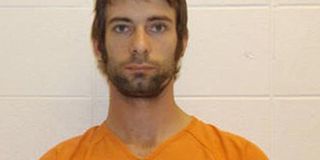'American Sniper' killer mentally ill, US court hears

This booking photo courtesy of the Erath County Sheriff's Department in Stephenville, Texas, shows shooting suspect Eddie Ray Routh. Routh is charged with murder of US Navy Seal Chris Kyle and Chad Littlefield. AFP PHOTO
What you need to know:
- Kyle had been trying to help Routh, who suffered from post-traumatic stress disorder.
- In a sign that Kyle and Littlefield knew something was badly wrong, the court heard how they swapped alarmed text messages shortly before they were killed.
WASHINGTON
A former Marine on trial for killing the US Navy Seal whose story inspired Oscar-nominated blockbuster American Sniper was so mentally ill he did not know what he was doing, a Texas court heard Wednesday.
Eddie Ray Routh, 27, could face the rest of his life behind bars if convicted of murdering famed US sniper Chris Kyle and his friend Chad Littlefield at a Texas shooting range in February 2013.
Kyle, officially credited with killing 160 people during four military tours in Iraq, has been lionised in Clint Eastwood's controversial movie starring Bradley Cooper as the soldier.
But defence lawyer Tim Moore pleaded insanity for Routh, telling the start of the murder trial in the small Texan town of Stephenville that his client was mentally ill.
"When he took their lives, he was in the grip of a psychosis. A psychosis so severe at that point in time that he did not know what he was doing was wrong.
"Routh thought Kyle and Littlefield wanted to take his life," Moore told the court in the town around 100 miles (160 kilometers) southwest of Dallas.

Taya Kyle, wife of slain US Navy SEAL Chris Kyle, is escorted to a waiting vehicle as she leaves the Erath County Donald R. Jones Justice Center in Stephenville, Texas, on February 11, 2015. AFP PHOTO | BRADLEY WADE
The 38-year-old Kyle had been trying to help Routh, who suffered from post-traumatic stress disorder. Routh served a tour of duty in Iraq in 2007 with the US Marines.
In a sinister sign that Kyle and Littlefield knew something was badly wrong, the court heard how they swapped alarmed text messages shortly before they were killed.
"This dude is straight up nuts," Kyle wrote to Littlefield. "He's right behind me, watch my six," replied his friend, using military jargon for "watch my back."
CONFESSED
After the shootings on February 2, 2013, Routh took Kyle's truck and was arrested at his sister's home.
He allegedly confessed to the killings after complaining that "people were sucking his soul and that he could smell the pigs".
Prosecutor Alan Nash told the court that mental illness "doesn't take away the ability to know what's right and wrong."
Prosecutors are not seeking the death penalty in what is expected to be a two-week trial. Instead, Routh faces the possibility of life in a mental hospital or life in prison if convicted.
Kyle's widow, Taya, took the stand on Wednesday, sobbing and wiping her eyes with a tissue as she recounted their life together.
Lawyers have questioned whether Routh could receive a fair trial in the small town, given the success of American Sniper and the widely held view of Kyle as a hero.
But the judge dismissed an application by Routh's lawyers to delay the trial.
Eastwood's film, based on Kyle's book American Sniper: The Autobiography of the Most Lethal Sniper in US Military History, has smashed a series of box office records on the way to winning six Oscar nominations.
However, the film, which has so far earned more than $280 million to become the highest grossing war film in history, has attracted controversy for its depiction of Kyle and its view of the Iraq War.
Critics claim it presents a simplistic, black-and-white view of the Iraq conflict, and glosses over Kyle's references to Iraqis in his memoir as "savages."




